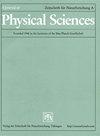为什么动量取决于惯性?
IF 1.3
4区 物理与天体物理
Q4 CHEMISTRY, PHYSICAL
Zeitschrift Fur Naturforschung Section A-A Journal of Physical Sciences
Pub Date : 2023-10-12
DOI:10.1515/zna-2023-0168
引用次数: 0
摘要
对于以低于光速运动的粒子,动量是用惯性质量来表示的,而对于那些缺乏惯性的粒子,动量完全是用能量来表示的。这种差异是否表明在这两种情况下动量的物理起源是不同的,如果是的话,在涉及这两种粒子的相互作用中,实际上守恒的是什么?在本文中,我们考虑了最近提出的静止质量能量的引力起源,以证明动量的单一定义适用于所有粒子,无质量或其他。当引入这种描述时,惯性质量仅仅是粒子的“自由”能的替代物,但并不意味着动量的起源与没有质量的粒子不同。本文章由计算机程序翻译,如有差异,请以英文原文为准。
Why does momentum depend on inertia?
Abstract Momentum is characterized in terms of inertial mass for particles moving at less than the speed of light, but entirely in terms of their energy for those lacking inertia. Does this difference suggest a physically distinct origin of momentum in the two cases and, if so, what is actually being conserved in interactions involving both types of particle? In this paper, we consider a recently proposed gravitational origin for rest-mass energy to demonstrate that a single definition of momentum applies to all particles, massless or otherwise. When introduced into this description, inertial mass is merely a surrogate for the particle’s ‘free’ energy, but does not imply an origin of momentum different from that of particles without mass.
求助全文
通过发布文献求助,成功后即可免费获取论文全文。
去求助
来源期刊
CiteScore
3.00
自引率
5.60%
发文量
81
审稿时长
3.3 months
期刊介绍:
A Journal of Physical Sciences: Zeitschrift für Naturforschung A (ZNA) is an international scientific journal which publishes original research papers from all areas of experimental and theoretical physics. Authors are encouraged to pay particular attention to a clear exposition of their respective subject, addressing a wide readership. In accordance with the name of our journal, which means “Journal for Natural Sciences”, manuscripts submitted to ZNA should have a tangible connection to actual physical phenomena. In particular, we welcome experiment-oriented contributions.

 求助内容:
求助内容: 应助结果提醒方式:
应助结果提醒方式:


